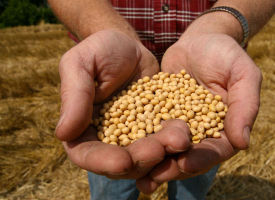
The researchers used Monsanto’s own data, which was for a period
of ingestion of only 90 days, and
reached these conclusions:
We therefore conclude that our data strongly suggests that these GM
maize varieties induce a state of hepatorenal [liver and kidney] toxicity.
This can be due
to the new pesticides (herbicide or insecticide) present specifically
in each type of GM maize, although unintended metabolic effects due
to the mutagenic properties of the GM transformation process cannot
be excluded [42]. All three GM maize varieties contain a distinctly
different pesticide residue associated with their particular GM event
(glyphosate and AMPA in NK 603, modified Cry1Ab in MON 810, modified
Cry3Bb1 in MON 863).
Why should GM foods have this sort of effect?
These substances have never before been an integral part of the human
or animal diet and therefore their health consequences for those who
consume them, especially over long time periods are currently unknown.
Humans generally have centuries of experience with most other foods,
and have rejected or developed appropriate preparation methods for those
that are toxic.
Plus until recently humans weren’t in the habit of eating pesticides
that had been deliberately engineered to be toxic to other species.
Especially without testing first to see if they might be toxic to humans….
One of the four authors of this research paper in the peer-reviewed
International Journal of Biological Sciences, Gilles-Eric Seralini,
had already established that
Glyphosate Formulations Induce Apoptosis and Necrosis in Human Umbilical, Embryonic, and Placental Cells. In other words, RoundUp causes human birth defects.
So if Monsanto’s pesticide doesn’t get you or your children directly, it can still get you in your food.
And maybe not just in food containing corn, given that
chickens fed feed including Monsanto corn show abnormal gene expression.
Maybe somebody will study people who eat chickens fed Monsanto corn and see
what effects that has.
But remember, while the evidence mounts that Monsanto is poisoning the world’s
food supply, Forbes just named Monsanto company of the year!
All this other stuff is just economic externalities, and profit is all that matters!
 Guess which company came in
worst of all in Swiss firm Covalence’s survey of least ethical companies?
Hint: it’s Forbes’ Company of the Year.
Guess which company came in
worst of all in Swiss firm Covalence’s survey of least ethical companies?
Hint: it’s Forbes’ Company of the Year.





